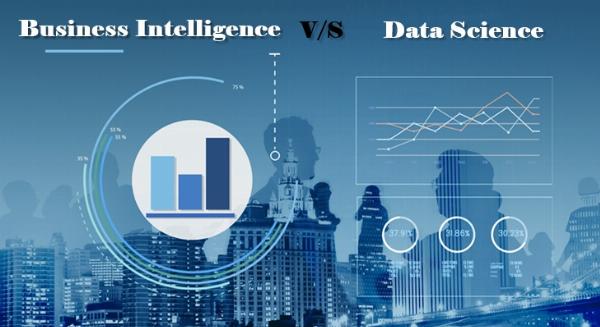Business Intelligence vs. Data Science: Unveiling the Powerhouse Duo

Strong 8k brings an ultra-HD IPTV experience to your living room and your pocket.
Introduction
In today's data-driven world, two terms often come up in discussions about data management and analytics: Business Intelligence (BI) and Data Science. Both play crucial roles in helping organizations make informed decisions and drive strategic initiatives. While they share some similarities, BI and Data Science have distinct functions and applications. Understanding the differences and complementary nature of these fields can empower businesses to leverage their data more effectively.
Understanding Business Intelligence
Evolution of Business Intelligence
Business Intelligence has evolved significantly over the past few decades. Initially, BI focused on basic reporting and data aggregation. However, with advancements in technology, it has grown to encompass more sophisticated data analysis techniques, including data mining, predictive analytics, and real-time reporting.
Key Components of Business Intelligence
1. Data Warehousing: Centralized repositories for storing data from multiple sources.
2. Data Mining: Extracting patterns and knowledge from large datasets.
3. Reporting: Generating periodic reports to monitor business performance.
4. OLAP (Online Analytical Processing): Tools for analyzing data from multiple perspectives.
BI Tools and Technologies
Some popular BI tools include Tableau, Power BI, and QlikView. These tools provide interactive dashboards and visualizations that help users interpret data quickly and accurately.
BI in Different Industries
Business Intelligence is widely used across various sectors. In healthcare, BI helps in patient management and operational efficiency. In retail, it aids in inventory management and sales forecasting. Financial institutions use BI for risk management and regulatory compliance.
Understanding Data Science
Evolution of Data Science
Data Science has emerged as a field that blends statistics, computer science, and domain knowledge to extract insights from complex datasets. It has grown from traditional data analysis to include advanced techniques such as machine learning and artificial intelligence.
Key Components of Data Science
1. Data Collection: Gathering data from various sources.
2. Data Cleaning: Preparing data for analysis by removing errors and inconsistencies.
3. Data Analysis: Examining data to uncover patterns and trends.
4. Machine Learning: Building models that can predict outcomes and automate decision-making.
Data Science Tools and Technologies
Popular tools in Data Science include Python, R, TensorFlow, and Hadoop. These tools facilitate data manipulation, statistical analysis, and the development of machine learning models.
Data Science in Different Industries
Data Science applications are vast and varied. In marketing, it helps in customer segmentation and campaign optimization. In healthcare, it assists in predictive analytics for patient outcomes. The finance sector uses Data Science for fraud detection and algorithmic trading.
Business Intelligence vs. Data Science
Key Differences Between BI and Data Science
While BI focuses on descriptive and diagnostic analytics, providing insights into what happened and why, Data Science emphasizes predictive and prescriptive analytics, forecasting future trends and suggesting actions.
Complementary Nature of BI and Data Science
BI and Data Science are not mutually exclusive. BI provides a foundation of reliable data and insights, which Data Science can build upon to develop predictive models and uncover deeper insights.
Use Cases Where BI is More Suitable
BI is ideal for routine reporting, performance monitoring, and data visualization. It helps businesses keep track of their KPIs and make informed operational decisions.
Use Cases Where Data Science is More Suitable
Data Science excels in scenarios that require predictive modeling, anomaly detection, and the creation of recommendation systems. It is valuable for tackling complex problems that involve large, unstructured datasets.
Applications of Business Intelligence
Enhancing Decision-Making
BI tools help executives make data-driven decisions by providing real-time insights into business performance.
Optimizing Business Processes
By analyzing operational data, BI can identify inefficiencies and suggest improvements, leading to streamlined processes and cost savings.
Increasing Operational Efficiency
BI dashboards provide a holistic view of operations, enabling managers to allocate resources effectively and improve productivity.
BI in Marketing and Sales
In marketing, BI helps track campaign performance and customer behavior. In sales, it supports pipeline management and sales forecasting.
BI in Finance
Financial institutions use BI for risk management, regulatory compliance, and financial planning.
BI in Healthcare
Healthcare providers leverage BI for patient management, operational efficiency, and improving care quality.
Applications of Data Science
Predictive Analytics
Data Science models can forecast future trends, helping businesses anticipate market changes and customer needs.
Personalization and Recommendation Systems
E-commerce platforms use Data Science to personalize user experiences and recommend products based on past behavior.
Fraud Detection and Prevention
Financial institutions deploy Data Science techniques to detect and prevent fraudulent activities by analyzing transaction patterns.
Data Science in Marketing and Sales
Marketing teams use Data Science for customer segmentation, campaign optimization, and sentiment analysis. Sales teams leverage predictive models to identify high-potential leads.
Data Science in Finance
In finance, Data Science supports algorithmic trading, credit scoring, and risk assessment.
Data Science in Healthcare
Healthcare applications include predictive analytics for patient outcomes, personalized treatment plans, and disease outbreak prediction.
Benefits of Business Intelligence
Improved Data Quality
BI ensures data accuracy and consistency, leading to more reliable insights.
Better Business Decisions
With comprehensive data analysis, businesses can make informed decisions that align with their strategic goals.
Competitive Advantage
Companies using BI can respond quickly to market changes and stay ahead of competitors.
Increased Operational Efficiency
BI tools help identify and eliminate inefficiencies, leading to cost savings and improved productivity.
Benefits of Data Science
Uncovering Hidden Patterns
Data Science techniques can reveal patterns and correlations that are not immediately apparent.
Predictive Power
By building predictive models, businesses can anticipate future trends and make proactive decisions.
Enhanced Customer Experience
Personalized recommendations and targeted marketing improve customer satisfaction and loyalty.
Innovation and New Opportunities
Data Science drives innovation by identifying new market opportunities and optimizing existing processes.
Challenges in Business Intelligence
Data Quality Issues
Ensuring the accuracy and consistency of data can be challenging, particularly with data from multiple sources.
Integration of Data from Various Sources
Combining data from different systems and formats requires sophisticated ETL (Extract, Transform, Load) processes.
Scalability
As data volumes grow, maintaining BI system performance can be difficult.
Challenges in Data Science
Data Privacy and Security
Handling sensitive data requires strict adherence to privacy regulations and robust security measures.
Complexity of Data
Managing and analyzing large, complex datasets can be technically demanding.
Skill Gap
There is a high demand for skilled Data Scientists, leading to a talent shortage.
Interpretation of Results
Translating complex analytical results into actionable insights requires clear communication and domain expertise.
Conclusion
Business Intelligence and Data Science are powerful tools that help organizations harness their data to drive strategic decisions and innovation. While they have distinct functions, they complement each other to provide a comprehensive data management and analysis solution.
Integrating BI and Data Science can provide businesses with a competitive edge, enabling them to leverage historical data and predictive insights to make informed decisions.
Businesses should explore the integration of BI and Data Science to fully realize the potential of their data. Investing in the right tools and skills will ensure they stay ahead in the competitive landscape. For those interested in deepening their knowledge, various online courses and certifications, including data science training in Delhi, Noida, and other locations in India, are available to get started.
Note: IndiBlogHub features both user-submitted and editorial content. We do not verify third-party contributions. Read our Disclaimer and Privacy Policyfor details.




